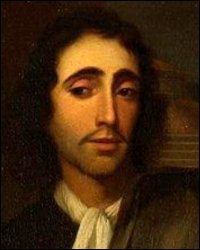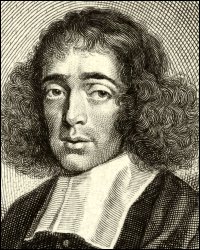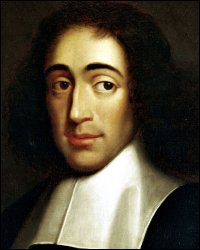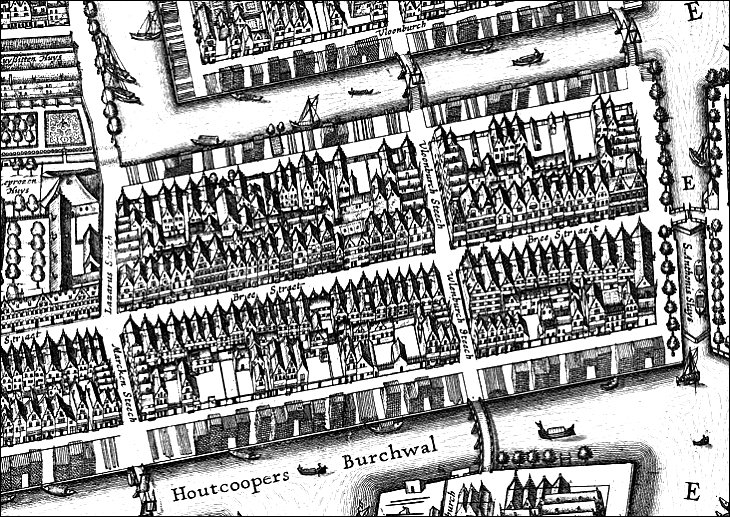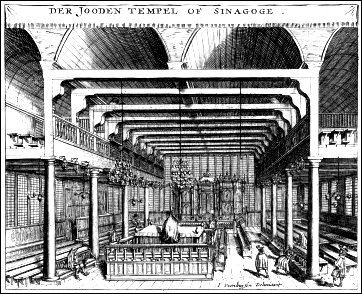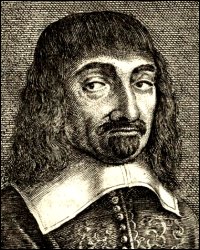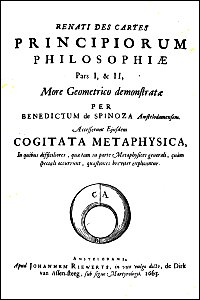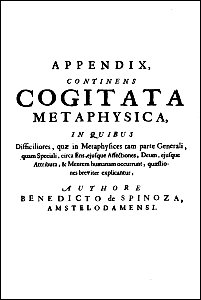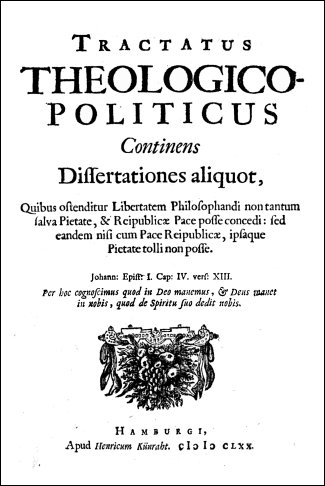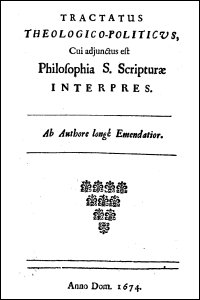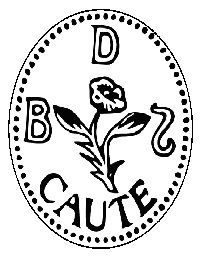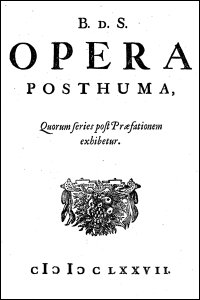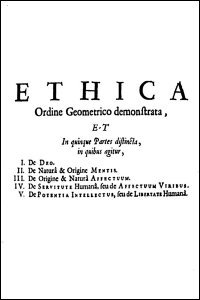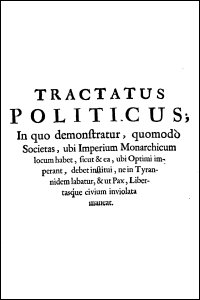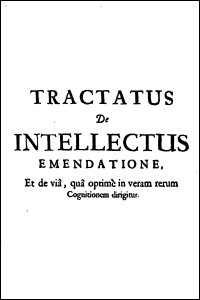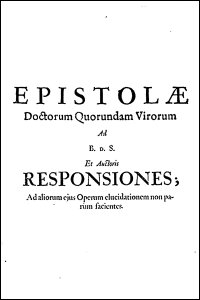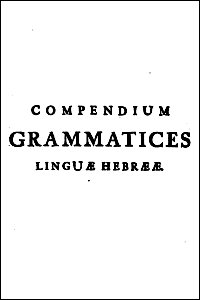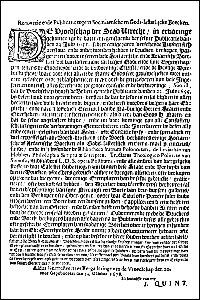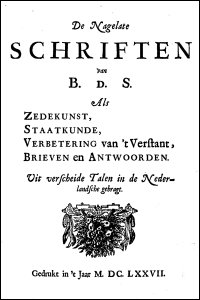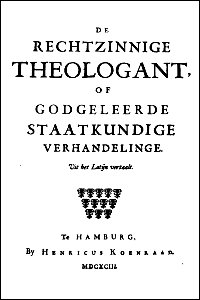Spinoza

Baruch SPINOZA / Bento de ESPINOSA
[ Benedictus de SPINOZA – ברוך שפינוזה / BdS ]
![]()
(Amsterdam, 24 November 1632 – Den Haag, 21 February 1677)
![]()
Dutch humanist from Portuguese (Sephardic Jewish) origin.
—
Rationalist (post-Cartesian), scientist (physics, optics), free-thinker philosopher, progressist social theorist, democratic and republican political ideologist, holly texts (Bible) exegete, main inspirer of XVIIIth century’s Radical Enlightenment.
—
![]()
![]()
PORTRAITS
—
—
—
BIOGRAPHIC CHRONOLOGY
—
| 1632 − | Birth (November, 24) in the Jodenbuurt [Spanish-Portuguese-Jewish quarter] of Amsterdam, in the Netherlands; son of Micael de Espinosa (1587/8-1654), a successful trader of fruit from Portugal, Morocco, the Canaries and Brazil, and his second wife, Hana Debora Espinosa (~1606-1638); paternal grandson of Isaac Rodrigues Espinosa [Ischac de Espinosa, Pedro/Pêro Rodrigues/Roiz Espinosa] (~1550-1627) and Mor Alvares (~1558-1616); maternal grandson of Henrique Garcês [Baruch Senior] (1598-1619) and Maria (Clara) Nunes (~1568-~1639), all ascendants being Portuguese «marranos» (Sephardic Jews forced to convert to catholic religion) or «conversos» (new-Christians) escaped from the Inquisition persecutions. |
| 1638-1649 − | Attendance of the Keter Torah yeshiva [Talmud school, ישיבה כתר תורה] of Amsterdam under the teaching of rabbi Saul Levi Morteira [שאול מורטירה] (1596-1660), founder of that school (1638). |
| Possible contact with the less traditional rabbi Menasseh ben Israel [Manuel Dias Soeiro, מנשה בן ישראל] (1604-1657), an open-minded, and cosmopolitan teacher working in that same school. |
—
| 1640 − | Most probable perception of the final, quite tragic, events in the persecution process moved by the Jewish community against Uriel da Costa [Gabriel da Costa Fiuza, Uriel Acosta, Uriel d’Acosta] (1585-1640), a remarkable exiled – a sceptic and a free-thinker – Portuguese Jew, leading to his dramatic suicide (April): public burning of his book EXAME DAS TRADIÇÕES PHARISAICAS [Examination of the Pharisaic Traditions] in an auto-de-fé [faith demonstration]; three banishments [Venice (1618), Amsterdam (1623, 1633)]; extremely shameful terms imposed to attempt a reconciliation. |
| 1649 − | Following the death (September, 24) of his elder brother, Isaac, Baruch de Espinosa ends his formal studies to start working in the family business. |
—
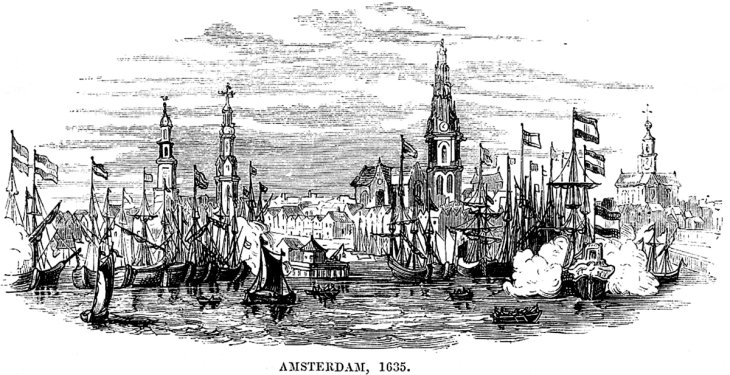 |
—
| 1650 − | Begining of Latin studies, Natural Sciences (physics, mechanics, chemistry, astronomy, and physiology) and Philosophy with Franciscus/Francis van den Enden [Van den Ende, Van den Eijnde, Van den Eijnden, Van den Eynde] (1602-1674), a former Jesuit who had become a free-thinker, a religion unorthodox (anti-trinitarian, anti-hierarchical, &c.) adept, and a political pioneer promoter of republican and democratic ideas. ⊕ |
| 1651 − | Probable first contacts with the philosophical works of Niccolò Machiavelli (1469-1527), Francis Bacon (1561-1626), Thomas Hobbes (1588-1679), and René Descartes (1596-1650). |
| 1652 − | Development of interest in the physics of light and optics. |
| Despite paternal strong opposition, Baruch Spinoza starts an activity on lens-grinding for optical instruments (microscopes and telescopes). |
—
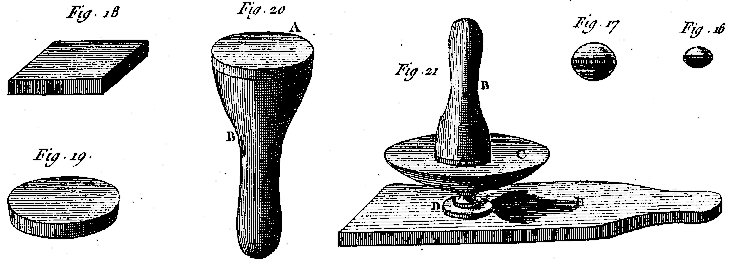 |
—
| 1654 – | Following the death of his father (March, 28), Baruch renounces his inheritance after winning a court dispute against Rebekah de Espinosa, the sister. |
| Meetings with the “churchless Christians” Pieter Balling, Jarig Jelles, Jan Rieuwertsz, and Francis Van den Enden, in Amsterdam. | |
| Starts of teaching in the free enquiry school of Francis Van der Einden. | |
| 1655-57 – | Probable period of attendance of philosophy lessons in Leiden. |
| 1655 – | Baruch de Espinosa begins attending meetings of critical liberal Jews, such as the philosophical seminars promoted by doctor Juan de Prado and poet Daniel Ribera. |
| A heated exchange with local Sephardic rabbis at the weekday evening discussion group of Keter Torah yeshivah [ישיבה כתר תורה], the Jewish school, led to an accusation of heresy – materialism and “contempt for the Torah” – before the Tribunal of the Congregation. | |
| Probable writing of KORTE VERHANDELING VAN GOD, DE MENSCH EN DES ZELFS WELSTAND; TRACTATUS DE DEO ET HOMINE ET JUSQUE FELICITATE [Short Treatise on God, Man and his Well-being], an essay that remained manuscript, unpublished, and relatively unknown until the discovery, in the second half of the nineteenth century, of two non-autographed Dutch manuscripts, very probably translations of a lost original. | |
| 1656 − | Excommunication, cherem [חרם], from the Amsterdam Sephardic Synagogue (July, 27), with the fiercest conditions the community ever imposed on a member, apparently due to Spinoza’s “evil opinion and acts”, “abominable heresies which he practiced and taught”, and “monstrous deeds”. ⊕ |
—
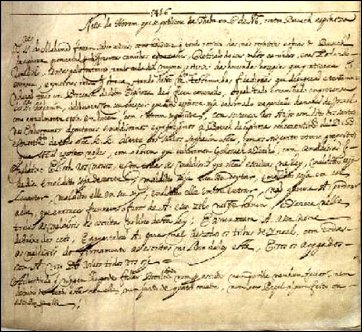 cherem on Spinoza |
—
| 1656-58 – | Expelled from Jewish community, Spinoza establishes relationships with people from the scientific and cultural circles of the Netherlands, and namely, contacts with Christian groups: English Quakers and «colegiantes» (politicians and editors among them), unorthodox Calvinists who, advocating a policy of peace and a liberal economy, opposed the supporters of orangism, Orthodox Calvinists in favor of the domination of the state by the Church, who condemned economic development, considering it contrary to the Bible. Some of the participants in this group secured a lifetime pension for Spinoza. |
| 1660 – | The Amsterdam synagogue denounces Spinoza to the municipality as a “menace to all piety and morals”. |
| 1661 – | Fearing the consequences, Spinoza moves from Amsterdam to Rijnsburg, near Leiden. |
| Spinoza begins writing a philosophical study on Ethics. | |
| Meeting with Henry Oldenburg, co-founder (original fellow) and first secretary of the British Royal Society, then recently created (1660). |
|
| 1662 – | Probable writing of TRACTATUS DE INTELLECTUS EMENDATIONE [Treatise of the Emendation of the Intellect] never finished and only posthumously published. |
| 1663 – | Move to Voorburg, outside Den Haag, taking residence with the painter Daniel Tydemann. |
| 1664 − | Publication, in the Hague, of RENATI DES CARTES PRINCIPIORUM PHILOSOPHIAE [Principles in Cartesian Philosophy] along with COGITATA METAPHYSICAL [Metaphysical Thoghts/Speculations], as an appendix, only work published, during his lifetime, under his own name, Latinised as Benedictum/Benedicto de Spinoza. |
—
—
| 1668 – | Adriaan Koerbagh (1633-1669) together with his brother, Johannes (1634-1672), close friends of Spinoza, under the pseudonym Vrederick Waarmond, publishes two religion sceptical books, in Dutch language: EEN LIGT SCHIJNENDE IN DUYSTERE PLAATSEN [A Light Shining in Dark Places] and EEN BLOEMHOF VAN ALLERLEY LIEFLIJKHEYD SONDER VERDRIET [A Flower Garden of All Kinds of Loveliness without Sorrow]. |
| Both books were condemned as “scriptum pessimum, blasphemum, atheisticum” [lousy, blasphemous and atheistic writing], their authors captured (July, 20), violently tortured and sentenced to 10 years in prison, dying Adriaan Koerbagh a few months later (October, 15). |
—
—
| 1669 − | Move to Den Haag, Stille Veerkade, living on a pension from the Grand Pensionary of the Netherlands, Jan de Witt. |
| 1670 − | Publication of the Tractatus Theologico-Politicus (TTP) [Theological-Political Treatise] – printed without authorship attribution and referred to a false publisher and imprint – blaming tyranny, ignorance and religious authority for the oppression and degradation of mankind; defending philosophic freedom from religious and political interference, advocating total separation between State and Church, between politics and religion, and between philosophy and revelation: “the true purpose of the state is in fact freedom”. |
—
—
| 1670 − | The Church Council of Amsterdam (Calvinist) denounces the Tractatus Theologico-Politicus [TTP] as “a work forged in Hell by a renegade Jew and the Devil and issued with the knowledge of Mynheer Jan de Witt” |
| 1671 – | Spinoza exchanges books with Gottfried Wilhelm Leibniz (1646-1716): receives Notitia Opticae Promoteae and sends back his Tractatus Theologico-Politicus. |
| 1673 – | Declining an invitation from the Elector of the Palatinate, Spinoza refuses a professorship of Philosophy at the University of Heidelberg due to concerns with academic freedom. |
| The States of Holland publishes (July, 19) a formal condemnation of the Theological-Political Treatise and “other heretical and atheistic writings”. | |
| 1674 – | After former actions aiming to prevent the circulation of the Tractatus Theologico-Politicus, in spite of the generally ineffective censorship in the Dutch Republican, an official ban was determined. |
| 1675 – | Benedict de Spinoza completes the writing of Ethica Ordine Geometrico demonstrate [Ethics demonstrated in Geometric Order], but gives up publishing it knowing that representatives of the Calvinist Church were appealing to civil authorities to prevent him to do so due to rumours that such book envisaged demonstrating the non-existence of God. |
| Several contacts with Leibniz, in Den Haag. | |
| 1675-76 – | Writing of the Tratatus Politicus [Political Treatise]. |
| 1677 – | Death (February, 21) from lung disease. |
| Posthumous publication, by the initiative of a group of his friends, of the Opera Posthuma [Posthumous Works] of Baruch de Spinoza [B.d.S.]: Ethica [Ethics], Tractatus Politicus [Political Treatise], Tractatus de Intellectus Emendatione [Treatise of the Emendation of the Intellect], Epistolae [Correspondence], Compendium Grammatices Linguae Hebrae [Hebrew Grammar compillation]. |
—
—
| 1677 − | First printed publication of a Dutch translation of Spinoza’s Opera Posthuma: De Nagelate Schriften van B. d, S, [Posthumous Works]. |
| 1678 − | Aggravation of penalties (October, 24) for selling or even possessing the Tratatus Theologico-Politicus, the Opera Posthuma, or other books written or inspired by Spinoza. |
| 1693 – | First printed publication of a Dutch translation of Spinoza’s Tratatus Theologico-Politicus [TTP], De Rechtzinnige Theologant of Godgeleerde Staatkundige Verhandelinge. |
.—
———

